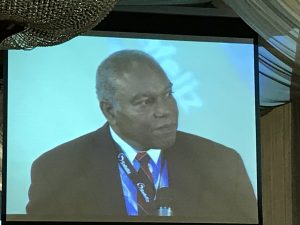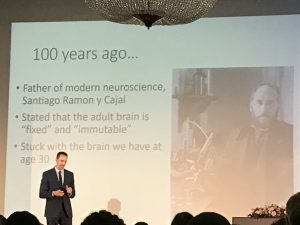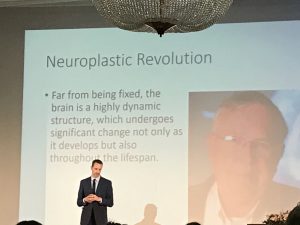2nd European Health Conference in Bucharest, Part II
2nd European Health Conference in Bucharest, Part II
The third day of the conference
Vitriato Ferreira, MBChB Key factors in achieving and maintaining normal weight
According to OECD there are more and more people overweight and obese. And more and more young people become overweight and obese. The results are heart disease, type 2 diabetes, cancer, etc. Children exercise less and eat more.


Body Mass Index is not the best measure to decide about overweight or obesity. It becomes inaccurate if a person is very tall and slim. The best marker is your waist circumference. It shows whether you are at higher risk for type 2 diabetes, high blood pressure, high cholesterol, and heart disease.
If you want to lose weight, the suggestion is to go slowly because your BMR (Basal metabolic rate is what your body uses just to stay alive) drops when the body thinks you are hungry. It means you metabolism would slow down and it becomes harder to lose weight. Therefore, huge drops of caloric intake are not the best way to lose weight – we should not go over 500 calorie loss per day, then the body does not realize it is hungry.
Eat early – lose weight. Sleep is also important if one wants to shed some kilograms. If you want to lose weight you need to exercise at least 45 min. a day.
www.supertracker.usda.gov is a link where you can get your personalized nutrition and physical activity plan, and get tips to make healthier choices.
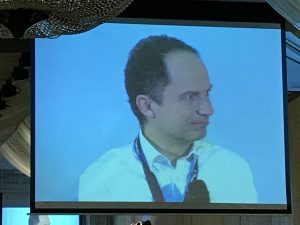

Zeno L. Charles-Marcel, MD The science of reversing type 2 diabetes with lifestyle intervention
Rapid economic growth that brings about transition from low income to high income economies over a short period of time brings about most rapid rise of type 2 diabetes. Examples are Nauru, India, Mauritius, Fiji, and the Middle East. However, the causes of type 2 diabetes are not just prosperity, we have epigenetics, genetics involved, and environmental factors, such as stress, unhealthy diet, physical inactivity etc.
Type 2 diabetes can now be understood as a state of excess fat in liver and pancreas and remains reversible at least 10 years after onset in most individuals.
David DeRose, MD, MPH Treating high blood pressure without medications
30 – 50% of adult population in the world have high blood pressure (HBP). It extends to every country of the world. We are in the midst of pandemic. If you don’t have it today, it is likely that it is waiting for you on the road. A 64 year-old person has a likelihood of 64% to have HBP. When you get into your 60s it is likely that your age shows the prevalence of the HBP. It is 90% of likelihood of developing HBP between the ages of 55 and 65. Epigenetics plays its role. We are all at risk of HBP. HBP is related to many illnesses, including dementia, blindness, etc.
Reverse HBP naturally.
Normal is under 120/80. David DeRose has written a book “30 days to natural blood pressure control” that can be bought in Amazon. He is also the President of Compasshealth (compasshealth.net), where he provides free material for people to use.
Things that lower high blood pressure naturally: foods containing ACE inhibitors – plant-based diet, being socially connected, moderate exercise (including strength training), weight control, stress relief, forgiveness, merry heart, hopefulness, etc.
Anabel Facemire, MD, FACC Reversing heart disease in clinical practice
Western diet, stress, toxins, smoking cause atherosclerosis. Animal foods seem to injure blood vessels. It is caused by carnitine / lecithin. It can be found also in soft drinks. Large amount of meat consumption is associated with 60% increase in cardiovascular diseases (CVD). At the same time protein from nuts and seeds can reduce CVD by 40%. In 1960s Finnish men had the world’s highest death rate from heart disease. Their diet was: whole milk, cheese, salt, sausages and cigarettes. Everything green was dismissed as “food for animals”. However, by the early 2000s the number of death in Finnish men of CVD had decreased by 75%. Reduced salt consumption by 1/3 caused large decrease in hypertension, fruit and vegetable consumption increased, dramatic reduction in smoking happened. To achieve such result governments, food factories, shops, schools, health institutions, etc. have to cooperate.
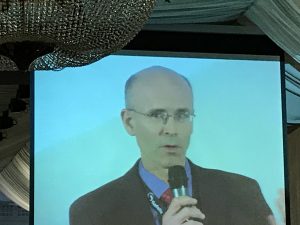
Zeno L. Charles-Marcel, MD Lifestyle medicine: A dose response relationship.
Does lifestyle therapy have dose response relationship? Below threshold no noticeable response is seen, but It might be there. Different people can also respond differently to medicines – some people are oversensitive, some people may be more resistant. It works the same way in lifestyle changes. No people are the same, even twins have different biochemistry.
What is happening in your mind is also very important, it is biochemical, and these changes translate into physiology. What we think and believe all influence us. Lifestyle causes biochemical changes in the body. Our lifestyle acts like any other biochemical action in the body. We have receptors all over the body that receive chemical signals.
Lifestyle physiologic therapies are:
- Diet (consider quantity, quality, frequency, content, fasting)
- Exercise
- Sleep
- Stress management
- Water
- Spirituality
The fourth day of the conference
Daniel Binus, MD, MPH Lifestyle medicine in psychiatry – New science confirming what we already know
Nature remedies work slowly but at the end nature remedies work wisely and well. Is it also true for mental disorders.
It was an old-school idea that depression was caused by “anger turned inside”. So the doctors gave patients some exercises to do to express their anger. But now we believe that it’s not the right way to treat depression. In 1960s antipsychotics and antidepressants with focus on dopamine and norepinephrine were introduced.
Primary treatment today for the depression is a “happy” pill – antidepressant, but however necessary they are, they just mask the symptoms. Rates of depression and anxiety in westernized countries seem not to go away, on the contrary, they have steadily increased since WWII, also among young people and students. People are waking up to the reality that medications won’t help in long-term.
Paradigm shift in mental health treatment is from neurotransmitters to neuroplasticity.
Our brain is constantly reshaped, remodeled by our lifestyle experiences, and when our brain does not do it properly, we get ill. The solution to the problem is not found in the pill.
Neuroplasticity is the capacity of the brain to develop and change throughout one’s life, something that once was thought impossible. It is just as easy to make negative changes as it is to make positive changes in the brain. Negative changes are caused by negative thinking, media, addictions, malnutrition, harmful stress, isolation and long-term use of psychiatric medications. In a short term the psychiatric medications help, but in a long term they create changes that are harmful. For people being on medications for a long time it is almost impossible to give them up. However, God can help.
Harvard study of adult development showed that relationships keep us happier, physically healthier and help us live longer, they also keep our memory sharper. According to a study, people satisfied with their relationships at their 50s, were healthier in their 80s. In Britain there is now even a Minister of loneliness. However, each one of us has the loneliness minister, Who is in the heavenly sanctuary. When we come to Him, we don’t need to be lonely. He gives us power to connect. Joshua 1:7. God has given us a lot of love.
Mental health and Spirituality
We are born to attach. Healthy attachment occurs when parents are quick to respond to a baby, sensitive to baby’s needs and also consistent. The child starts to believe that his / her needs will be met, and that they can trust others. It translates into better relationships when adults. They will be able to set healthy boundaries. The most important need of a human being is love.
A study on adverse childhood experiences (over 17,000 participants) showed that the most destructive problem for a child was chronic recurrent humiliation, what was termed as emotional abuse (parents calling their children stupid and worthless). When children feel rejected by their parents in that way, it has the worst impact on their health in the future.
Attachment gone wrong in childhood results in:
Avoidant attachment (e.g. a workaholic parent) – the emotional needs of a child are not met. When they grow up they will avoid close connections with others. They are rigid, intolerant, and critical. It’s important for them to be independent, self-sufficient.
Ambivalent attachment – parents inconsistent in response, sometimes sensitive, sometimes neglectful (e.g. alcoholic parent). Such children never know what happens next. When adults, they feel anxious and therefore tend to be controlling. They want to connect with people and want to be very close, they are afraid and insecure in their relationships. They try to control because they are afraid of what the other person might do next. They play others, they are erratic and unpredictable, sometimes charming. They feel that others do not want to get as close as they do.
Adverse childhood experiences have a huge impact also on a person’s physical health; they increase the risk of smoking, alcohol use, CODP, suicide, chronic illnesses, etc.
We are wired to connect. Adolescence opens the child’s eyes to the fact that parents are not able to provide for all of their needs for the rest of their life. They are looking for other places to help to fulfil their attachment needs. Jesus understood this transition when He said, “knew you not that I must be about my Father’s business? (Luke 2:49 KJ 2000 Bible).
“Among the Jews the twelfth year was the dividing line between childhood and youth. On completing this year a Hebrew boy was called a son of the law and also a son of God”. (DA p 75). But none of us have ever made this transition perfectly. It is hard for us to attach to God we have never seen or touched. We have hard time to attach to God and trust Him. We trust money and others, who we think support us. We can understand God’s love theoretically, but does our heart really believe it? Our emotions / heart only believe through experience. Jeremiah 17: 9, 10. We don’t know if we wholly trust God, only God knows it. What is going on in the emotional part of our mind, will be revealed under stress (limbic system hyperactivation and impaired frontal lobe function). Automatic responses take over when we are under stress. God reveals what is in our heart. “He who reads the hearts of men knows their weaknesses better than they themselves …” (AA p 524.2).
The root of all of our problems is not trusting God who tries to save us, but trusting ourselves (saving ourselves – fight or flight). All the other religions, except Christianity, believe that a person can save themselves. But the view of God is also very important: if patients with HIV / AIDS in one study believed in God, who was punishing them through their illness, the illness became worse, but if they believed in loving God, their health improved. It’s not just to believe in God, but experience – God is good, all the time; being able to say, “Despite not knowing “why”, I choose to trust you”.
Neil Nedley, MD Reversing depression
There are nine diagnostic symptoms of depression: deep sadness or emptiness, apathy, agitation, sleep disturbances, appetite changes, lack of concentration, feelings of worthlessness, morbid thoughts, fatigue. The cost of depression: 80% of those with depression are impaired in daily functioning. They are over twice as likely to take sick days. Depressed people are seven times more likely to become unemployed. Almost 1 million suicide happen each year. Depression is the 9th leading cause of death. There are now more deaths from mental illness than from lung cancer. You’re more likely to be cured of cancer than of depression with regular treatment. There are well over 100 causes of depression. People may go through several causes without getting depression, but one of the causes can influence them: genetic, developmental (childhood abuse), lifestyle, circadian rhythm, addiction, physical exercise, nutrition, toxic, social, medical condition (autoimmune disease, head trauma), frontal lobe causes, etc.
We need to increase the frontal lobe’s blood flow. It is in all time low because of the neglect of spiritual exercise (singing spiritual hymns, prayer, Bible reading).
Dr. Neil Nedley runs a depression treatment course.
Reversing the progression of dementia
With the dementia it is possible to reverse the progress of it, but it is not possible to completely reverse dementia / Alzheimer’s disease.
1 in 8 person at the age of 65 has dementia. Almost 47 million people are currently living with it. It is predicted that in 2030 it will go up to 82 million.
There are many causes of dementia. A personalized treatment plan is needed to deal with these causes.
Intelligence is our ability to learn, retrieve and apply knowledge. When you age it will take more effort just to retain your physical strength, but brain is not prone to this kind of aging naturally. If you are very bright when you are young, you will be like this when you are older. But it is also very easy to lose your memory.
How to lose your memory
Don’t pay attention at school
Don’t graduate from college
Become a couch potato
Watch a lot of TV and play with your devices (better if at the same time)
Check your email and social media constantly, spend a lot of time on Youtube
Don’t exercise
Masturbate and have excess sex
Don’t try to memorize anything, if you need to know something, just Google it (the art of remembering is the art of thinking. When you remember something, you have to associate it with something else, that helps you to think).
Eat lots of sugar
Eat foods high in cholesterol and saturated fats
Become overweight, obese
Eat lots of salt
Try to develop high blood pressure, diabetes, and / or depression / anxiety
Smoke tobacco, marijuana, and drink alcohol
If you do these things, you will be guaranteed to have a significant memory loss, sometimes already in your 30s or 40s. In order not to get dementia, do not do these things.
The non-modifiable risk factors for dementia are:
Age. The older you get, the more likely you get it
Being female. Female gender is more likely to be influenced by dementia
Daniel Binus, MD, MPH Neuroplasticity and mental disorders: A paradigm shift for mental health treatment
Neuroplasticity is the capacity of the brain to develop and change throughout life and it is just as easy to make negative changes as it is to make positive ones in the brain.
It was thought that most neurons synthesize and release just one neurotransmitter but now it is clear that at least some neurons can use more than one transmitter and can switch the transmitter they use even converting excitatory synapses into inhibitory ones.
Humans produce 700 new brain cells each day. Humans have amazing capacity of learning during their lifetime.
You can have disposition to depression and anxiety, but it doesn’t mean you get depression or anxiety. Epigenetics has become an alternative to classical genetics for mental diseases. The genes are turned on or off depending on our lifestyle. Epigenetics is the factor that influences gene expression, not depending on genes themselves (see: www.ornish.com/wp-content/uploads/Intensive_Lifestyle_Changes_and_Prostate_Cancer.pdf and http://genetics.thetech.org/ask/ask314).
Marian Diamond made decades of research on brain and discovered 5 factors that influence neuroplasticity: newness, challenge, exercise, diet, and love. Other research adds sleep and healthy stress management.
Physical exercise for neuroplasticity:
- Pay attention to the feeling of your body during the exercise, enjoy what you are doing.
- Move with your whole body
- Rigorously avoid stereotypic movements (such as exercise machines). It is not the best type of exercise for the brain. With exercise machines your brain is not being challenged as much as when you are going jogging, for example.
- Variety
- Challenge yourself
John Pepper was diagnosed with Parkinson’s disease in his 30s. He began taking slow, conscious walks concentrating on each subtle movement of his body, and with this he created new brain pathways. Now, being in his 70s, he moves quickly and smoothly.
Nutrition
Brain has 2% of total body weight, but consumes 20% of total energy.
Eat more fruit, veggies, and whole grains (whole grain reduces the intake of simple carbohydrates).
Sugar has direct inflammatory effect, increases risk of depression, amplifies psychotic and anxiety symptoms.
A little bit of Curcumin (turmeric – ¼ teaspoon a day) is helpful, but high doses can actually be toxic to the brain. Anything in excess is not good.
Catechins
Resveratrol
Omega-3 fatty acid (plant-based source is algae)
Caloric restriction and intermittent fasting is good for your brain. It increases the cellular DNA repair, reduces oxidative stress and inflammation, improves glucose metabolism, optimizes immune and neuroendocrine function, can stimulate the production of new nerve cells, enhances learning, can ameliorate disease processes, etc. But fasting is only helpful if you get enough of the right nutrients. Intermittent fasting can be also 2 meals a day (not everybody can tolerate it, though).
Vitamin D influences the expression of 2000 – 3000 genes, inflammation and immune function. Low vitamin D levels are associated with poorer brain functions.
Brain fitness rules:
Reward yourself, in your mind, for any small progress
Work on a demanding level (doing things that are boring is not good for your brain)
Engage in activities that are inherently satisfying
Be intentional about skill development
Find activities that you can never master
Gaining expertise in any domain requires at least 4 hours of training per day for approximately 10 years (8 hours a day takes less time). (Brain HQ.com)
Learning a new language can be very helpful to stimulate the brain cognitively. Even short- term language training alters brain structure. Musical training is another way to stimulate brain. People that have musical training, especially before the age of 7, have better connections between the right and left hemisphere. If you help people connect the left and right brain after being traumatized, people process the trauma better. In one study people aged 60 – 84 had increase in processing speed while listening to background Mozart music in comparison to other 3 groups that had silence, white noise or background Mahler music. Both Mozart and Mahler music are associated with better memory, though.
Enjoy pro-cognitive social activities – travelling, concerts, art events, social groups, socializing with family, (“vegan”) dancing, retirement organisations, and pro-cognitive leisure activities: going out to nature, reading, discussion groups, board games, playing musical instruments, solving puzzles, learning a second language.
Good sleep is very important for neuroplasticity. Sleep restores the brain, some studies show that it even cleans the brain.
Negative neuroplasticity can be caused by a long-term use of psychiatric medications.
(Peter Breggin has written a book Psychiatric Drug withdrawal) media (systematic starvation of your frontal lobe), gaming, pornography, chronic stress, poverty.
How much is too much of screen entertainment time? Anything above 1.5 causes significant damage. Children under 3 should see no screen entertainment at all. For children over 5, maximum is 1 hour.
How long does it take for you to get chronic stress? One week. God does not want us to suffer from chronic stress, that’s why He has given us Sabbath.
Many researches concentrate now on resilience – how we can be more resilient to stress. “Adopting the right attitude can convert a negative stress into a positive one”, says Hans Selye. Resilience is enhanced by positive coping (gratitude), optimism, sense of purpose, self-efficacy, social support, taking moments of rest. In rest periods we normally get a lot of cell repair.
Parenthood changes the brain, especially motherhood, and it is good. You become a more holistic person. With fathers also, there are great changes in brain that occur, some of them are very similar to what happens in mother’s brain; increased volume of hypothalamus, amygdala, stratum and prefrontal cortex.
Power of imagination. What we meditate upon, makes a great difference. If we meditate upon loving God, it enhance the brain most and is based on reality.

